A new study that models the combined effects of a sugar-based tax on beverages and targeted subsidies for minimally processed foods and drinks found that under these policies, low-income consumers would purchase less sugar-sweetened beverages and more fruits, vegetables, and healthier drinks, particularly in households without children. Researchers from the Global Food Research Program […]
Price tag messaging can amplify the benefit of taxes
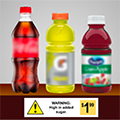
Researchers at UNC-Chapel Hill have found that combining taxes on sugary drinks with added messaging on price tags further discourages parents from wanting to buy sugary drinks for their children. Currently, over 60 countries and smaller jurisdictions around the world have levied taxes on sugary drinks in an effort to curb their consumption, yet these beverages […]
Randomized control trial shows promise for policies to reduce red meat purchases

Findings from a new study in PLOS Medicine conducted by researchers from UNC-Chapel Hill, Stanford University, and the University of Edinburgh indicate that warning label and tax policies effectively reduce purchases of red meat-containing items, such as burger patties, pepperoni pizza, and ham luncheon meat. Consumption of red meat has gained attention as a nutrition […]
Peru’s healthy food and beverage policies found to have no negative impact on industry jobs, wages
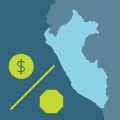
A new study published this month in the journal Food Policy finds that Peru’s food and beverage industry experienced no significant job or wage losses after the country began taxing sugary drinks and putting warning labels on the front of unhealthy food and beverage packages prior to the COVID-19 pandemic. The Peruvian government implemented these […]
More evidence that pandemic-era Healthy Helping program improved diet quality for North Carolinians with food insecurity

A new study published today in the November issue of Health Affairs underscores the positive impact of the Healthy Helping produce prescription program that provided North Carolinians facing food insecurity with $40 a month to spend on fruits and vegetables during the COVID-19 pandemic. Researchers from the University of North Carolina at Chapel Hill and […]
Increased WIC cash vouchers for fruits & vegetables have helped families eat healthier during COVID-19

Many U.S. families faced new or additional challenges to finding and paying for food during the COVID-19 pandemic. Among these are over 6 million women and young children who participate in the federal Special Supplemental Nutrition Program for Women, Infants, and Children (WIC), which provides nutrition education, supplemental foods, breastfeeding promotion and support, and referrals […]
Using Chile’s warning label criteria to tax foods and drinks: Potential effects on prices, purchases, and revenues
In a new study published in PLOS ONE, Drs. Arantxa Colchero, Guillermo Paraje, and Barry Popkin explore the possible impacts of a Chilean tax levied on products that currently carry warning labels and other regulation under the Law of Food Labeling and Advertising. The country has had a sugary drink tax in place since 2014, […]
Lessons learned from evaluations of sweetened beverage tax policies
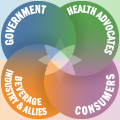
To date, over 50 countries and smaller jurisdictions around the world have enacted taxes on sugary drinks to improve population health. These taxes aim to reduce consumers’ sugary drink intake and encourage companies to offer healthier product options. They can also raise revenue to support other health promotion efforts. This policy approach has gained much momentum over […]
Study shows Chilean policy package led to declines in purchased calories, sugar, fat, and sodium
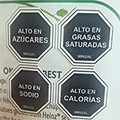
The latest evaluation of Chile’s Law of Food Labeling and Advertising finds that under Phase 1 of the law’s implementation, Chileans purchased significantly fewer calories, sugar, saturated fat, and sodium than would have been expected had the law and its regulations not gone into effect. The study, published in the August issue of The Lancet Planetary Health, combined data on household food shopping […]
Sugary drink taxes based on volume vs. sugar density: Simulations comparing tax designs in Mexico find advantages to both
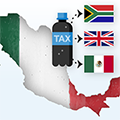
New research from GFRP graduate Juan Carlos Salgado Hernández, PhD and professor Shu Wen Ng, PhD, examines how different sugary drink tax designs compare to Mexico’s tax in terms of how effectively they might reduce the amount of sugar Mexicans buy from beverages and the volume of sugary drinks they buy at the store, as well as how much tax […]
Policies to curb unhealthy beverages abound. How do policymakers choose?
Research has long shown that sugary beverages – sodas, juices, sports drinks, sweetened coffees and more – are closely associated with adverse health outcomes such as heart disease, diabetes and obesity, and their consumption and popularity increased dramatically during the last half of the 20th century. Multiple countries have enacted policies to help reduce the […]
South African beverage tax has reduced purchases of sugar-sweetened beverages

A new study shows that South Africa’s 2018 tax on sugary beverages led to a reduction in purchases of the beverages, which could mean purchasers are consuming less excess sugar and calories. Shu Wen Ng, PhD, Associate Professor and Distinguished Scholar in Public Health Nutrition at the UNC Gillings School of Global Public Health, is […]
Adults in Mexico are consuming fewer soft drinks three years into its sugary-beverage tax
Three years after Mexico implemented a tax on sugar-sweetened beverages, the country’s adults are drinking fewer soft drinks, according to new findings from an international team of researchers. The team examined the self-reported soft-drink intake of participants in the three phases of Mexico’s Health Workers Cohort Study – a self-administered survey on health and lifestyle […]
UNC researchers project positive gains for children a year after Mexico’s sugary beverage tax
New research finds that Mexico’s 10-percent tax on sugar-sweetened beverages (SSB), implemented in 2014, could result in meaningful weight control for the country’s children and adolescents, particularly in those who had been high consumers of the beverages before the tax. Barry Popkin, PhD, is a co-author on “Body weight impact of the sugar-sweetened beverages tax […]
Ng quoted in USA Today article on proposed sugary drink tax in CT
Shuwen Ng is quoted in a USA Today article about the proposed statewide sugary drink tax in Connecticut, and the article presents an infographic sourced from our maps of sugary drink taxes throughout the world. Connecticut may become the first state in the country to tax sugar-sweetened beverages if Gov. Ned Lamont has his way. […]
GFRP Researchers quoted in Vox article covering success of junk food taxes
An article published January 17, 2018 on Vox highlights the successes of junk food taxes enacted in two countries (Mexico & Hungary), summarizes a recently published AJPH article from NYU & Tufts researchers making the case for a junk food tax, and quotes both Drs. Barry Popkin and Lindsey Smith Taillie on junk food spending […]
Colombia: Study predicts less sugary drink consumption with tax
GFRP researchers predict a tax on sugar-sweetened beverages in Colombia would lead to a decrease in purchases of those sugary drinks and a move toward healthier food choices in a new study published online December 20 in PLOS One. Juan Carlos Caro and team used data from the Colombia National Income and Expenditures Survey to estimate the price […]
Consumer Reports asks Can ‘Sin Taxes’ Solve America’s Obesity Problem?
A recent article from Consumer Reports, titled “Can ‘Sin Taxes’ Solve America’s Obesity Problem?” reviews recent policy levying taxes on sugar-sweetened beverages and junk food, the impact of such taxes in municipalities within America and countries around the world, and quotes Dr. Barry Popkin on the research surrounding these taxes and their effects on intake. While a […]
Study of the first year of Berkeley’s tax on SSBs
Recent research following the first tax on sugar-sweetened beverages in a US city (Berkeley, CA) has found a subsequent decrease in sales. A study titled “Changes in prices, sales, consumer spending, and beverage consumption one year after a tax on sugar-sweetened beverages in Berkeley, California, US: A before-and-after study” was published online in PLOS Medicine […]
SSB sales fall in Mexico after second year of taxes
Mexico’s peso-per-liter tax on sugar-sweetened beverages enacted in 2014 continues to affect sales of those beverages in the second year of the tax, show results from GFRP research, published in Health Affairs. The impact of the tax is important information about how taxes on foods or beverages affect consumer behavior, especially over a sustained period of […]